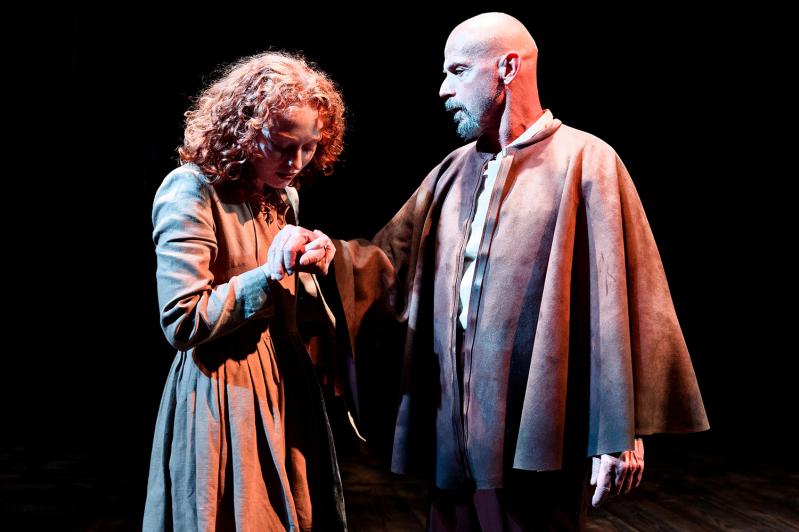It is a tribute to the genius of Arthur Miller that his 1953 play "The Crucible" resonates so profoundly in our contemporary culture. Though it was originally written as an allegory on McCarthyism, with the new production at Bay Street Theater in Sag Harbor you see echoes of everything from QAnon to what is currently regarded as "cancel culture." It is a reminder both of our hysterical, accusatory age and human beings' insatiable inclination for self-righteousness.
Of course the stakes were much higher in Colonial Massachusetts, where the drama is set -- it's one thing to be falsely accused and lose a movie career (see Kevin Spacey), but quite another to suffer execution. Between February 1692 and May 1693 more than 200 people were accused of witchcraft. Thirty were found guilty, and 19 of them were hanged (interestingly, 14 women and only five men). It was a mass hysteria that fed on itself, neighbors turning on neighbors, family members accusing one another, as the instinct for self-preservation turned average citizens into informers and liars.
The idea of witchcraft itself is a classic conspiracy theory -- practice it all you like, it will yield you nothing. As "The Crucible" begins, we learn that a Reverend Parris had discovered some local girls dancing naked in the woods around a "cauldron," apparently engaged in a pagan ritual initiated by his Barbadian slave Tituba. (Of course, these actions are as likely to summon the devil as in high school, when we used to drink beer in the woods listening to Black Sabbath while some idiot tried to carve a pentagram into his arm.) The purpose was to summon a curse on Elizabeth Proctor, a local farmer's wife. One of the girls, Abigail, has had an affair with Elizabeth's husband, John, and is smitten still.
This sets off a chain of events in which survival instinct runs up against pious indignation. Abigail and the other girls, petrified of being labeled witches, swear that they were just dancing, and Reverend Parris, in his prudish shame, claims the girls were not naked.
Frightened of being removed from the parish, the reverend hires John Hale, an "expert" in demonology, to investigate -- to conduct, literally, a witch hunt. At the Proctors' house, Elizabeth is accused of owning a "poppet," or puppet, with a needle in its abdomen. It's not even hers, but she is arrested anyway.
This culminates with the arrival of Deputy Governor Danforth, an officer who metes out punishment with a maniacal severity. "Hang them high over the town!" he bellows. "Who weeps for these, weeps for corruption!"
Deputy Danforth is played by Matthew Conlon, most often seen at the Hampton Theatre Company in Quogue. He is terrific here as Danforth, a man frightening in his moral conviction and skewed righteous logic. (At one point he decides that he will not reconsider the innocence of the remaining accused since it wouldn't be fair to the 12 who have already been hanged.) With his black cape he summons grand inquisitor, executioner, and undertaker all at once, and his lust for painful punishment is as close to anything satanic as there is in the play. Mr. Conlon is scarily good, using the mask of reason to hide a violent, punitive soul.
But the play lives and dies with John Proctor, who is the drama's moral center. Joe Pallister, memorably good in "Of Mice and Men" at Bay Street a few years ago, transcends even that performance here, giving Proctor strength and dignity even as he burns with shame about his affair with Abigail.
The play culminates with a blistering exchange between Proctor and Danforth, and Mr. Pallister and Mr. Conlon fill the stage with an electrical charge as darkness and light go hard at each other. Pathos replaces outrage when Proctor utters the famous lines about refusing to sign his forced confession, "Because it is my name! Because I cannot have another in my life!" All carried off beautifully here by Mr. Pallister.
Kate Fitzgerald as Abigail and Meg Gibson as Elizabeth are also notable performances in a production that, to an actor, seems nearly flawlessly performed. The director, Will Pomerantz, has done an astonishing job of whittling down Miller's play from its usual two-and-a-half-hour running time to a lean hour and 45 minutes. The result feels only slightly truncated, while gaining a swiftness and ferocity in its pacing. Wisely it is performed without intermission, letting the inexorable momentum build to its climax.
Famously, Arthur Miller was dragged before the House Un-American Activities Committee during the Cold War, asked to inform on writers and artists who were Communists. He refused to name names, and was ultimately not himself charged. But the fury and outrage he felt toward McCarthyism burns through every moment of "The Crucible."
In this sleek, searing new production, Bay Street Theater has captured the folly and evil of moral sanctimony. What better time could there be to revisit this timeless classic?
Showtimes are Thursday night and Fridays and Saturdays at 7 through Nov. 26, with three 2 p.m. matinees on Thanksgiving weekend. Tickets are $37 to $57.




